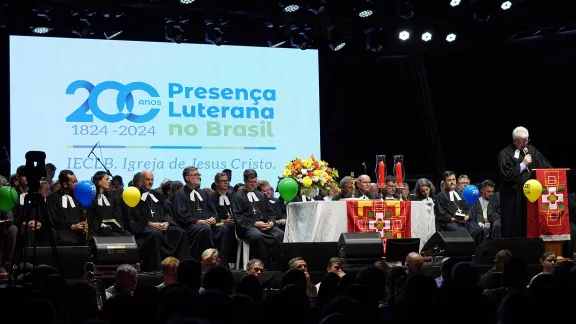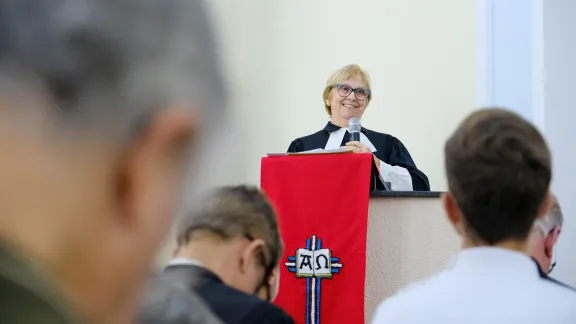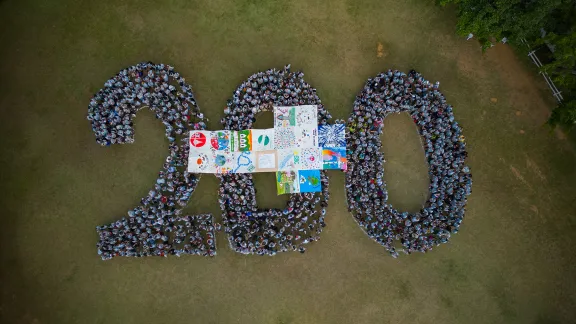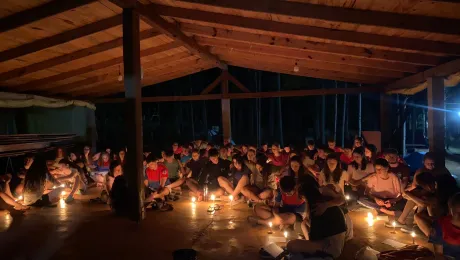
In 2024, the IECLB celebrates “200 years of Lutheran presence in Brazil”. Photo: IECLB
IECLB celebrates 200 years of Lutheran presence
(LWI) - In 2024 the Evangelical Church of the Lutheran Confession in Brazil (IECLB) marks "200 years of Lutheran presence in Brazil" with the theme from Matthew 28.20: "I am with you always, to the end of the age." Particularly memorable dates in this anniversary year are 3 May and 24 July, when the first Lutheran immigrants from Europe arrived in southern Brazil. They arrived in Nova Friburgo/Rio de Janeiro and São Leopoldo/Rio Grande do Sul, respectively.
Some celebrations were originally planned for this date in São Leopoldo. Instead, however, the historic event was commemorated with a national online service on 28 July. In May, heavy rainfall and flooding, particularly in the state of Rio Grande do Sul, left the area in a state of disaster, meaning that emergency aid for those affected, as well as clean-up and reconstruction work, remains a priority.
"In this anniversary year, we are focusing on our being church in this country and our role in this society – and not on 200 years of German immigration history," emphasized Rev. Sílvia Genz, Pastor President of the IECLB. "We want to be the church of Jesus Christ in Brazil." The flood and its effects have put this focus to an unplanned test, which the church faces with outstanding commitment.
Developing perspectives for the future
Before the flooding, a big mission conference (Fórum de Missão) was also part of the anniversary year in April. Delegates from all 18 synods – ordained and lay, men and women, old and young – of the IECLB met in São Leopoldo to develop the church's visions, goals and strategies for 2025 to 2030. "We worked on four topics, each of which is intended to help define our future path together as a church," says Genz. The topics were gospel and mission, education and training for full-time and voluntary workers, justice from economic, ethnic, ecological and gender perspectives, as well as administration, management and communication. The results are now being discussed and coordinated in working groups. The national church council should adopt the goals at their meeting in October.
"The lively participation in the Fórum de Missão has given me a lot of hope," said the pastor president, as the IECLB faces internal and external challenges. Maintaining and strengthening the church's unity is at the top of the list of priorities.

IECLB pastor president, Rev. Sílvia Genz, preaching at a service in Nova Friburgo/RJ. Photo: IECLB
Being a welcoming church
"We want to be a diverse and inclusive church," said Genz, referring to the Japanese, Turkish, Korean and Indigenous congregations already present in the IECLB. "But we can become even more welcoming and offer people from different backgrounds a spiritual home."
A look at history shows that this matter should not be taken for granted. In Brazil, the immigration of non-Catholics was made possible by the constitution of the empire (1822), which was then independent of Portugal and continued to regard the "Catholic religion" as the state religion but allowed other religions. However, these were only allowed to meet in private homes.
In 1824, the first Lutheran immigrants from Europe arrived in a country shaped by the Portuguese colonial period and the Catholic faith. Among them were numerous Lutheran people from Germany who wanted to live their faith in the new context and build a new life for themselves.
Lutheran Christians, who mainly were ordinary and often poor people, soon began to establish schools. "The congregations also met there for church services, and teachers often took on pastoral tasks," Genz said. It took many years for people to feel part of society and overcome their tendency to withdraw.
Today, the theological diversity within the IECLB requires "the ability and willingness to listen to one another," said the pastor president. "We have people who value traditions, others who want to be more political and uphold liberation theology, but also people with a pietistic-evangelical outlook and a conservative piety. And then there are also people with Pentecostal-charismatic influences."
Young people kicking off the anniversary
The IECLB's anniversary celebrations kicked off in July 2023 at the national youth congress, the 25th CONGRENAJE. More than 1,200 young people gathered here to reaffirm their faith and communion. The National Council of Evangelical Youth coordinator, Natan de Oliveira Schumann, had called for reflection on what is "essential and constant in these changing times." In his speech, he also reminded participants what their essence and service in society should be: "We are the good perfume of Christ; we are salt of the earth and light of the world."

IECLB youth kicking off the anniversary celebrations during the 25th CONGRENAJE. Photo: IECLB


